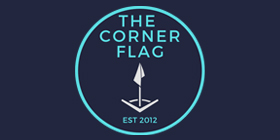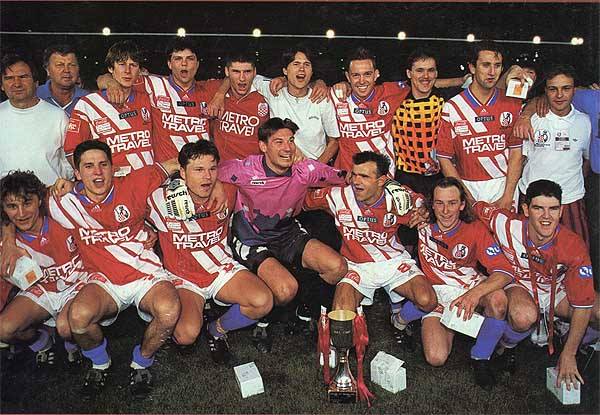Image: OzFootball
Over the course of many football clubs’ long histories, there exists a period of time when all things seem to come together.
Players, coaches, officials and supporters alike play their part and witness a golden generation claim success, which is passed on down to future generations and lives long in club folklore. For the Melbourne Knights, that period of time occurred in the mid-1990s as the club shook off its bridesmaids tag and won back-to-back NSL Championships with one of the best sides ever assembled in Australian football.
In addition to the on-field triumphs, their success came in a period of time when Croatia became an independent nation, much to the delight of the club’s loyal following, which had promoted this idea through its support of a side that had become synonymous with the Croatian cause over the decades following their formation in 1953.
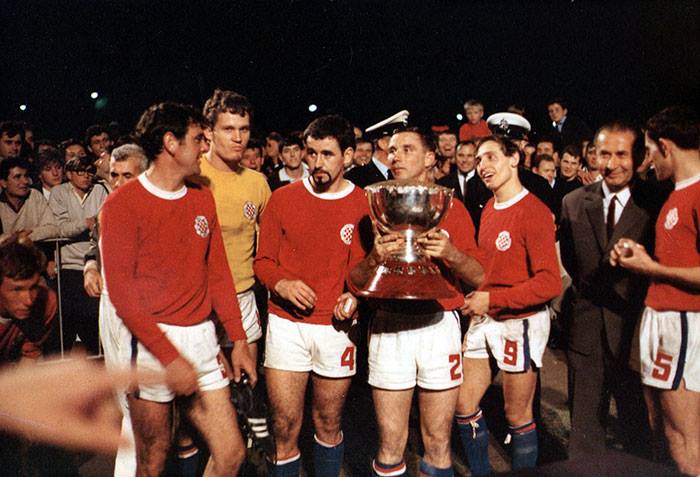
The club underwent many name changes in the early decades, but was primarily known as Croatia Soccer Club and achieved numerous success in the Victorian state leagues despite undergoing many trials and tribulations such as league expulsion in 1972.
Finally, in 1984 the club was permitted into the National Soccer League in an expanded two-tier conference format, with Croatia appointing legendary former Welsh international Terry Hennessey as its inaugural NSL coach. The squad consisted primarily of players who featured for the club in the 1983 State League season and included the likes of goalkeeper Peter Blasby, Scot Tommy Cumming, George Hannah and Joe Biskic. A poor start to the season saw Hennessey dismissed after nine rounds, as former coach Tony Vrzina took over with Croatia embarking on an undefeated 12-game run which culminated in a heartbreaking major semi-final defeat to South Melbourne – a sign of things to come.
A respectable second season followed under new coach Dom Kapetanovic, although a finals defeat to Preston Makedonia would begin a period of underachievement as Croatia failed to reach the finals in each of the following three seasons, despite some high-profile signings and the emergence of a 16-year-old full-back from their youth setup in Mark Talajic.
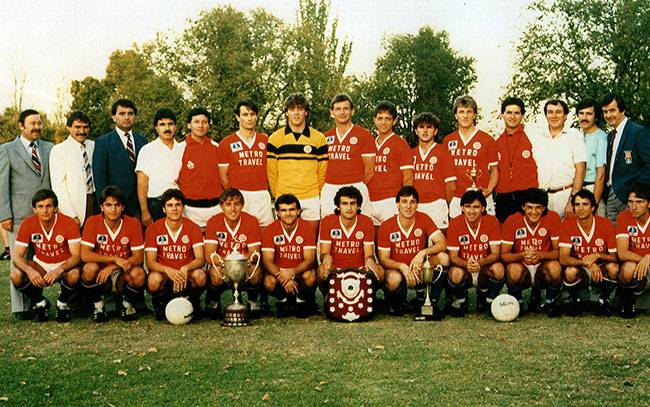
The tide turned in 1989 as a period of success began after Croatia recruited former Dinamo Zagreb forward Zeljko Adzic from Canada as well as London-born, Nigerian-raised striker Francis Awaritefe from the English lower leagues. Joining the pair were Ivan Kelic and Ivan Duzel from sister cub St Albans Saints, with the latter having spent his childhood playing on the streets of the Dalmatian city of Imotski with legendary Croatian footballer Zvonimir Boban.
Finals football returned to the club, although an agonising extra-time loss to Sydney Olympic ended their title aspirations in a year where the club moved from Olympic Park and into Melbourne’s western suburbs to the Melbourne Croatia Sports Centre in Somers Street, North Sunshine.
The turn of the decade saw the club sign 20-year-old Andrew Marth from Sunshine George Cross as the league became a competition played over the summer in a move aimed at boosting crowd attendances. A third place league finish set up another finals showdown against rivals South, with Croatia prevailing 7-6 in a pulsating penalty shootout to set up a preliminary final date with Olympic once more.
Despite Awaritefe’s opener on the half hour mark, Olympic equalised before the break through Robert Ironside and ultimately qualified for the grand final (which they won) thanks to Abbas Saad’s late winner. Despite the heartbreak, Croatia claimed the minor premiership the following campaign under the stewardship of Englishman Ken Worden. The regular season included many memorable moments, most notably clinching the premiers plate with a game to spare following an 8-1 thrashing of Wollongong in a game where Kelic bagged six goals.
In the major semi-final, they met old foes South once again for a spot in the grand final and would prevail thanks to Awaritefe’s second half strike, although a rematch occurred a fortnight later as South beat Zoran Matic’s Adelaide City to confirm an all-Melbourne season decider.
A crowd of 21,338 packed out the old home of Victorian soccer to witness the city’s two best and biggest clubs play out one of the most dramatic finals in Australian football history. The two teams were a who’s who of NSL stars, with Croatia fielding David Miller in goals, while Heidelberg legend Theo Selemidis marshalled the defence with club stalwart George Hannah, who had taken over the coaching reins of the side prior to Worden’s appointment.
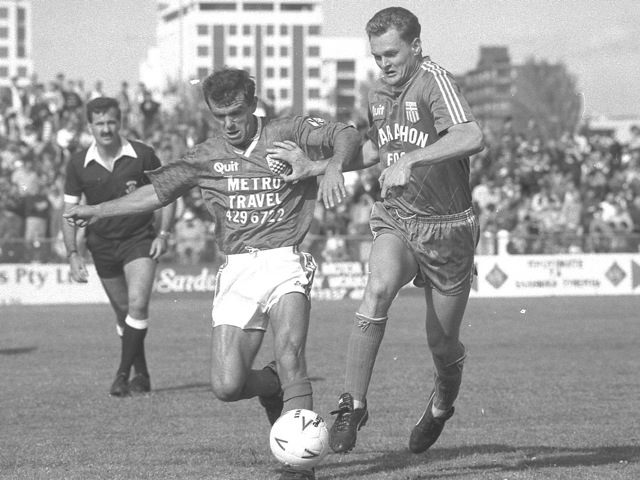
Talajic and former South poster boy Alan Davidson featured in the respective full-back roles, while the midfield was commanded by Biskic and Marth as Branko Milosevic and Joe Caleta provided the lethal strike force of Awaritefe and Kelic plenty of support in attack. In opposition that day was Ange Postecoglou, Paul Trimboli, Kimon Taliadoras, Paul Wade, Mehmet Durakovic, Mike Peterson, Steve Blair, Bruce Maclaren, Peter Tsolakis, Danny Wright and, of course, Joe Palatsides. On the South bench was the larger-than-life figure of the Galloping Major in Hungarian legend Ferenc Puskas.
Croatia opened the scoring mid-way through the first half through Marth, who up until that day had not scored all season. They dominated proceedings from there onwards and were unlucky not to go further ahead as South did their best to keep themselves within reach.
With just a few minutes on the clock remaining, the Knights fans in the stands began chanting for a second goal, in addition to their usual cries of Živjela (Long Live) Croatia. The players on the park seemed confident of doing that, and instead of shutting up shop at the back went in search of a second. With the game entering the 88th minute, a piece of Trimboli brilliance saw him pick out an open Palatsides who made no mistake in equalising to send the game into extra-time.
The following 30 minutes failed to separate the two rivals and it was left to the dreaded penalty shootout to decide the tense encounter. South blinked first as Trimboli missed his spot-kick, while man-of-the-match Biskic fired home the next penalty to give Croatia the advantage. Petersen then saw his effort saved by Miller, prompting commentator John Kosmina to contend that it “was all over for South Melbourne now”. Up stepped Marth to put his side within touching distance of their first NSL crown as club officials prepared to pop open the champagne bottles.
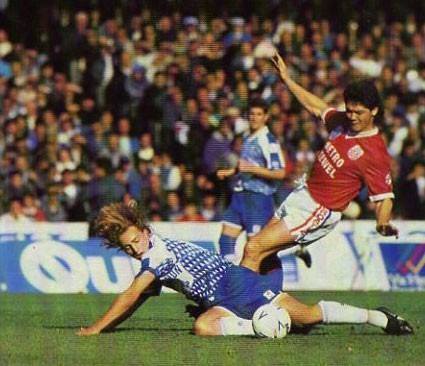
But Marth uncharacteristically missed, although that was quickly forgotten as Palatsides struck the post, having sent Miller the wrong way. As luck would have it, it was to be Davidson who had the chance to win it against the club he made over 150 appearances over the course of the early to mid-1980s. However, he too saw his effort cannon of the post despite having Maclaren beaten, as Hellas captain Postecoglou then stepped up and confidently struck his kick off the underside of the crossbar.
Despite the setback, Croatia were still one kick away from winning their maiden national Championship and turned to 19-year-old substitute Mark Silic. A product of their thriving youth system, Silic had an abundance of confidence about him, but as he stepped up to take the pivotal penalty, nerves seemed to take a hold of him. Maclaren dived the wrong way as Silic’s kick thumped the crossbar, and the teenager put his hands on his head in disbelief. Tsolakis rammed home South’s advantage, before goalkeeper Miller calmly thumped home his penalty straight down the middle of the net. The resulting five penalties were all converted, before an exhausted and cramping Kelic stepped up to take Croatia’s eighth spot-kick. He skied his effort over the bar as Hellas and their supporters went into delirium, while Croatia players, staff and supporters stood devastated and in disbelief as to how the title got away from them.
Over the course of the off-season, the attention of many Croatia supporters turned to events on the other side of the world as their ancestral homeland declared independence from Yugoslavia. Fierce fighting broke out over the European summer of 1991 as the quest for Croatian statehood saw the community in Melbourne united in solidarity and support with their compatriots back home. The club, which had served as a political statement of the desires of the Croatian people for an independent country, continued its role throughout these years as preparations began for the club to go one better in 1991/92.
However, the club was told it had to drop Croatia from its name by Soccer Australia as the governing body tried to increase mainstream appeal of the game through a de-ethnicisation process. Reluctantly the club was renamed Melbourne CSC as former player Ken Murphy took over from Worden and attained the services of promising 21-year-old forward Damian Mori from George Cross via VPL outfit Bulleen, while youngster Oliver Pondeljak also became an important first team member.
History was to repeat itself in more ways than one as CSC ended the season in first place, with Awaritefe and Mori registering double digits as part of an exciting front three alongside Kelic. A grand-final rematch against South Melbourne awaited in the major semi-final as a tense 120 minutes saw penalties decide the contest one more – with Croatia prevailing 5-3 at Olympic Park to set up another home final.
Unlike the previous year, Adelaide City defeated South in the preliminary final and lay between Worden’s side and the Championship. In a tight affair, Croatia’s best two chances of the game fell to Mori, who had a header tipped onto the crossbar by City goalkeeper Robert Zabica, while another one of his headers in the first half was cleared off the line. Hannah and Marth also went close to scoring, and it was the former of the two who had his penalty saved in the shootout to condemn Croatia to its second successive Grand Final defeat.
The following season was a transition year for the club, with the formidable back-line of Davidson, Hannah, Selemidis, and Talajic all departing Somers Street, while Mori moved to Grand Final nemesis Adelaide. Awaritefe joined cross-town rivals South and would later be joined at Lakeside by Kelic, who ended his time with Croatia in 1993 by moving to Olympic.
The big-name departures saw the Knights finish the season in 10th and well outside the finals race, with coach Branko Culina dismissed following a poor run of form mid-way through the season. To Culina’s credit, he did bring into the club a number of players who would play their part in forthcoming seasons, such as full-back Fausto de Amicis, North Geelong Warriors pair Steve Horvat and Adrian Cervinski, with his brother David joining the following season alongside another youngster in Vinko Buljubasic. But perhaps his biggest coup was bringing back Knights junior Mark Viduka to Melbourne following the teenager’s time in Canberra with the AIS.
The rest, they say, is history.
End of Part 1.
